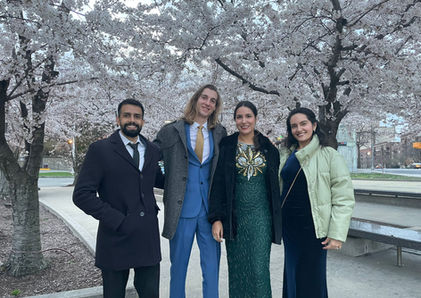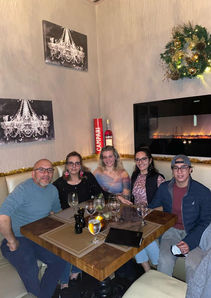
Student Spotlight


Ana Mejia-Bautista
PhD Student, Neural and Behavioural Science Program
My interest in exploring a career in science can be traced back to my undergraduate years at Stony Brook University. Three professors, in particular, played pivotal roles in shaping my fascination with scientific inquiry and research. These mentors not only imparted valuable knowledge but also instilled in me a profound appreciation for the scientific process and the transformative power of asking the right questions.
Their guidance during my undergraduate education and research work was instrumental in deepening my understanding of various scientific disciplines. Through their mentorship, I realized the immense impact one can have on a particular field by approaching it with curiosity and the ability to pose insightful questions.
Inspired by their example, I embarked on a path of scientific exploration, driven by a desire to contribute meaningfully to my chosen field and make a positive impact through the pursuit of knowledge.
I completed my bachelor's and master's at Stony Brook University in Biomedical Engineering. I am currently pursuing my doctorate in Neural and Behavioral Science here at Downstate

The spark that fuels research.......
My area of research is epilepsy. Despite the progress made, there still exists a significant gap in our understanding of epilepsy, particularly in terms of predicting, controlling, and truly comprehending epileptogenesis. Our laboratory is currently delving into the alterations in cortical neural circuit function triggered by traumatic brain injuries , which can result in neuropathologies like posttraumatic epilepsy. We are especially intrigued by the changes TBI induces in the balance between excitatory and inhibitory signals. Employing advanced techniques such as wireless EEG and electrophysiology, we are working towards evaluating these transformations.
Our objective is to enhance our comprehension of how the balance between excitatory and inhibitory factors is disrupted following a traumatic brain injury. We are particularly interested in exploring how certain medications, which seem to decrease the occurrence of post-traumatic epileptogenesis, contribute to the alteration of this delicate balance. My co-mentor, Dr. Jeffrey H. Goodman at the Institute for Basic Research (IBR), is an expert in kindling models, tracking epileptogenesis, and tethered EEG. His guidance and expertise equip me to conduct comprehensive investigations into the underlying mechanisms of post-traumatic epilepsy, contributing invaluable insights to the field and advancing my academic and research goals. Additionally, the collaborative atmosphere at IBR fosters an environment where faculty members are approachable and readily available to offer assistance and support, encouraging fruitful collaborations that enhance the scope and impact of
The highlights of my experience at Downstate consistently revolve around the exceptional people with whom I am surrounded. The friendships and mentorships I've cultivated have left an indelible mark on my life, for which I am profoundly grateful.
I selected SUNY Downstate for several compelling reasons. The primary factor that drew me to pursue my PhD here was the remarkable individuals I encountered during the admissions process. I distinctly recall my conversation with Ellen, who exuded kindness and made me feel incredibly welcome. Engaging with current students and faculty further solidified my decision; witnessing their vibrant personalities and unwavering passion for science, I felt an immediate connection and knew this was the ideal environment for my academic journey.
The highlights of my experience at Downstate consistently revolve around the exceptional people with whom I am surrounded. The friendships and mentorships I've cultivated have left an indelible mark on my life, for which I am profoundly grateful.
Throughout my academic journey, I've faced various challenges, particularly when experiments didn't unfold as anticipated, leading to moments of self-doubt about my capabilities as a scientist. During such times, my support system—comprising family, friends, and mentors—has proven invaluable. Their unwavering encouragement and belief in my abilities have consistently lifted me during moments of doubt. They serve as a constant reminder of the trajectory I've chosen and the goals I've set, helping me navigate challenges and reaffirming my commitment to the path I've embarked upon.
I would offer this piece of advice to future trainees: have faith in yourself and don't shy away from taking risks, even if they seem intimidating. The true loss occurs when you never attempt something due to fear, as you automatically forfeit the opportunity for success. Remember, you have to be in the game to win it. Embrace challenges, believe in your capabilities, and be open to the growth that comes with stepping outside your comfort zone.

Future goals...........
In the next few years, I aim to enhance my mentorship skills and further strengthen my scientific expertise in my field. I envision myself closely collaborating with students from diverse backgrounds who have an interest in research, aiming to inspire and demonstrate that anything is achievable through hard work and dedication.
Beyond my research, I've developed an interest in reading both fiction and journalistic nonfiction. This serves as a welcome escape from my daily routine, allowing me to immerse myself in diverse adventures. Recently, I've gravitated towards murder thrillers and fantasy, relishing the suspense and creativity they offer.



